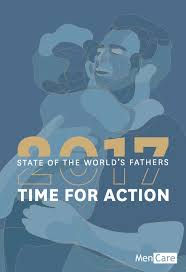How can men become more involved in unpaid carework?
- jogongender
- Sep 14, 2017
- 4 min read

In no country in the world do men’s contributions to unpaid care work equal women’s.
This is the opening paragraph of the State of the World's Fathers: Time for action Report just published, which aims to answer the question- How can men become more involved in unpaid carework?
I know many see the word 'report' and read no further. However I love research findings. So i've summarised them so you can read it in one easy blogpost. The issue of unpaid care work is an important one when discussing gender, and the report is very clear and informative on what is and should be happening.
It is the second of such reports carried out for MenCare, a global fatherhood campaign to promote men's involvement as equitable, non-violent caregivers for family well-being and health, and for gender equality.
Where are we now?
Many men want to be more involved in their children's lives, for example 46% of men in the US feel they do not see their children enough.
- Women spend more time than men do in paid and unpaid work combined.
- In developed countries women spend on average 2.1 times that of men daily on unpaid work. The biggest gap is in South Aisa where women carry out 6.5 x that of men.
- The time women spend on unpaid work holds them back in paid work and employee benefits, and restricts access to a social life, civic involvement and education.
- Gaps in unpaid care work are slowly narrowing (slowly being the important word).
What's the aim?
- For every country to set a national goal and for a global goal of males doing 50% of unpaid care work.
Factors affecting this:
- Gender norms that say caregiving is 'women's work' and the laws and policies reinforcing this.
- Workplace and economic norms maintaining the division of labour at work and at home.
What is needed?
- All individuals must see themselves as both caregivers and financial providers and be supported in this.
- Job protected parental leave that is equal, paid and non-transferrable. Where this has taken place is one of the areas where gender norms have positively shifted.
- Fair pay for all. This links with a UK based study that showed parents in low-paid jobs are penalised for requesting family-friendly hours. 48% of fathers felt stigmatised due to needing flexibility. I have certainly seen this in workplaces, meaning the lower paid parent often has to become the main caregiver. Who usually earns more? The father, so that he works rather than caring and gender norms are reinforced.
- Welfare and poverty payments being given to the main caregiver, not just for mothers. Studies show that the payments help children regardless of which gender is given the money.
- Widely available parenting training for men. This lowers violence, increases father's involvement in childcare and brings about greater gender equality in the household.
The report action plan to achieve this:
- Set goals, strategies and budgets at an international level to achieve equality in unpaid work.
- Systematically measure men and women's time use.
- At a national level implement action plans to promote male sharing of unpaid work.
- Build these strategies into public institutions that can enable male sharing of unpaid work.
- Teach all children to see the value of care work and that it is the responsibility of all regardless of gender.
- Provide training for fathers to challenge traditional attitudes, learn and build skills in equal parenting and care work.
- Recruit more men into paid caregiving professions.
- Train health and social service staff to engage men as equal caregiving partners.
- Use welfare programs to promote greater involvement in unpaid care work.
- Implement policies that support an individuals' unpaid care work as well as their paid work.
- Offer equal, paid, non-transferable parental leave for all parents.
What are the benefits?
- Men can break out from the constructs of manhood and build more meaningful relationships, resulting in improved mental and physical health.
- Children's development and wellbeing is improved by having an involved father. They see men can care and women can work, resulting in improved gender equality.
- Women's health improves when care work is shared and their societal participation increases.
- Society then doesn't have to be based on gender roles, but upon individual preferences. Decision making will include more life experiences and more women can contribute to the workforce.
I'd also like to add that relationships improve by being more equal and having shared experiences, respecting each others needs and easing each others burdens. Often it is assumed that women somehow prefer being the main unpaid caregiver, rather than seeing that she is beholden to societies expectations and systems.
The International Labour Organization (ILO) estimates it will take 75 years before women and men achieve equal pay for equal work, with equal representation in spheres of power predicted to take even longer. The report urges that the time for action is now; 75 years is too long a wait. I wholeheartedly agree.
Find the executive summary or the full report here- https://sowf.men-care.org/



Comments